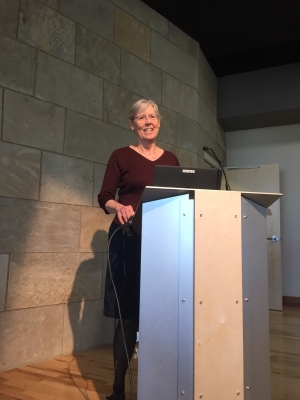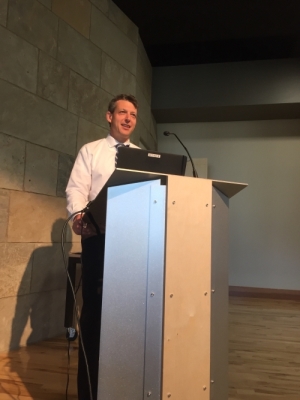Medical Aid in Dying: What You Need to Know
- Category: General
- Posted On:
- Written By: Boulder Community Health
 In 2016, Colorado passed a law giving individuals new options when facing unrelenting pain and suffering at the end of their lives. The Colorado End-of-Life Options Act allows a terminally ill adult to take a prescribed lethal dose of medication to end his or her life — a voluntarily process known as Medical Aid in Dying (MAID).
In 2016, Colorado passed a law giving individuals new options when facing unrelenting pain and suffering at the end of their lives. The Colorado End-of-Life Options Act allows a terminally ill adult to take a prescribed lethal dose of medication to end his or her life — a voluntarily process known as Medical Aid in Dying (MAID).During a free health lecture attended by more than 270 people, BCH ethics committee member Jean Abbott, MD, and BCH Chief Medical Officer and Vice President Ben Keidan, MD, provided answers to common questions about the Act and MAID.
A Controversial Subject
“MAID is currently legal in only seven states – Oregon, Washington, Montana, California, Vermont, Hawaii and Colorado – as well as in the District of Columbia,” said Dr. Abbott, who got the lecture underway.
Even though only a few states have laws supporting MAID, a right to aid in dying is supported by the majority of Americans.
“Results of national polls relating to MAID have been relatively stable since the early 90s. A recent GALLUP poll showed that nearly 7 of out 10 Americans — 69 percent — supported it,” Dr. Abbott said. “Even a recent Colorado survey revealed similar results, with 70 percent of those surveyed supporting an aid-in-dying law.”
Although supported by a majority, MAID is a controversial subject. One of the fears of implementing such laws is that those who are minorities, uninsured or uneducated would be disproportionately affected by it. This “slippery slope” concern is that vulnerable people might be pushed toward MAID instead of expensive prolonged treatments.
 “The Colorado law is modeled after Oregon’s 'Death with Dignity' law, which was enacted in 1997. The close record-keeping of Oregon’s two-decade-old law has provided evidence that the practice of MAID is safe,” Dr. Keidan said reassuringly. "Users are predominantly elderly, white and well educated and there is little indication that it is has been abused or misused."
“The Colorado law is modeled after Oregon’s 'Death with Dignity' law, which was enacted in 1997. The close record-keeping of Oregon’s two-decade-old law has provided evidence that the practice of MAID is safe,” Dr. Keidan said reassuringly. "Users are predominantly elderly, white and well educated and there is little indication that it is has been abused or misused."
The Law’s Important Safeguards
Drs. Abbott and Keidan reviewed a number of important safeguards in Colorado’s End-of-Life Options Act to ensure MAID remains safe, while protecting dying persons against abuse.
1. Individuals must be terminally ill.
Dr. Abbott said that MAID is available only to a person who has a life expectancy of six months or less to live.
2. Individuals must be mentally competent.
“MAID is not an option for persons with dementia or anyone else who lacks the mental capacity necessary to make informed medical decisions,” said Dr. Abbott. “There’s also a lengthy process for consent.” Aid-in-dying individuals must affirm and reaffirm their desire for aid in dying with voluntary expressions (two oral, one written), two weeks apart. They can change their mind at any point.
3. Two physicians must confirm the prognosis and that the individual can make medical decisions.
Said Dr. Keidan: “Besides confirming the prognosis, the physicians need to determine whether the individual is acting voluntarily and has made an informed choice of aid in dying. They must also inform the terminally ill patient about the full range of end-of-life options, including hospice, palliative care and pain management, as well as the potential use of medical aid-in-dying medication —and that the patient may choose to obtain the aid-in-dying drug, but not take it.”
4. Individuals must be an adult resident of Colorado.
MAID is not an option for children. Requiring individuals to be Colorado residents is a safeguard for preventing the state from becoming a magnet to people wanting MAID.
5. Individuals must perform the life-ending act themselves.
Dr. Abbott said family members or friends can help prepare the prescription medication, but the law requires that the individual must consume the lethal medication on their own.
For other requirements of the law and additional information, visit the Colorado Department of Health and Environment (CDPHE) at https://www.colorado.gov/pacific/cdphe/medical-aid-dying.
MAID is a Safe and Rare Event
After 20 years of legalization in Oregon, MAID has been found to account for less than one-half of one percent of deaths in the state. “All of the safeguards have ensured that aid in dying remains a safe and rare event,” stated Dr. Keidan.
He added, “BCH supports the purpose of the Colorado End of Life Options Act, even though only a small percentage of our patient population will take advantage of MAID. We recognize and support terminally ill patients and their loved ones in making informed health care decisions regarding all of their end-of-life options.”
Dr. Keidan said the hope is that MAID will be one part of the spectrum of care BCH can provide throughout the life process. “One tool in our toolbox for care.”
You can read more about BCH’s policy on our website. Also, on Feb. 4, 2018, the Daily Camera ran an extensive front page article about BCH’s implementation of the Colorado End-of-Life options act. Read the article here.
Click here to view PowerPoint slides from the lecture titled "Medical Aid in Dying: What You Need to Know."
Want to receive notification of special events and lectures? Sign up to receive email notifications.